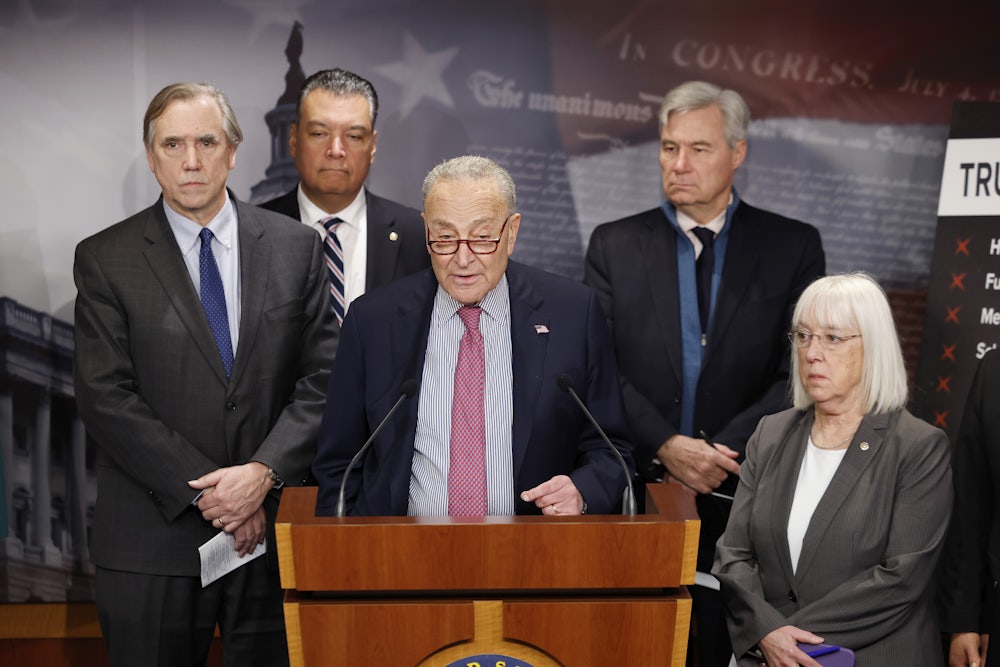I spent almost a decade covering the United States Senate. So, believe me when I tell you that I do not want to be a United States senator. Imagine having a job where your mere existence in the role is a symbol of democratic backsliding, where your leaders torture you by forcing you to watch five-year-old videos of your co-worker microwaving canned tuna, and where you literally hold the same title and standing as Tommy Tuberville—an anthropomorphized ChatGPT answer to the question of “What if we gave a supposedly important position of public trust to someone too ignorant to know the three branches of government and too incompetent in his previous role to beat Vanderbilt in football?”
But two weeks into the Trump administration—which is just as lawless, destructive, and inhumane as anyone who lived through the last one could have imagined—it is clear that Democrats on Capitol Hill are failing so spectacularly to confront a constitutional crisis (which their own political incompetence helped create) that I am willing to channel the anger coursing through my body and finally put my country before my own personal well-being.
Today, it brings me no pleasure to announce that I am launching an exploratory committee for a Senate run to replace the senior senator from my home state, Dick Durbin. And I think anyone of good conscience should join me in what’s known as “testing the waters” to run against their sitting members of Congress too. There is very little entailed; anyone can do it. All it takes is not accepting or spending $5,000, not saying outright that you’ve decided to run, and a dream that we can break through to some of the most feckless, dense politicians history has ever seen.
Democrats are deeply, historically unpopular right now, with a 57 percent unfavorability rating. This is absolutely no one’s fault but theirs. Their failure is so vast that they’ve yet to figure out why people are so unhappy. They’re listening to consultants who have only ever lost elections and Sunday morning talk-show hosts who platform insurrectionists and who tell them reaching their hands across the aisle is what the American people want. They’re wrong: According to a recent study conducted by the Center for American Progress, “bipartisan solutions” are what voters value the least.
It would never in a million years occur to Democrats that maybe their supporters are mad because they gave bipartisan cover to Donald Trump to turn Guantánamo Bay into a concentration camp for immigrants, helped to confirm a man whose only qualification for being transportation secretary was winning the Road Rules Challenge, and can’t stop talking about “finding common ground” with a party currently being run jointly by a convicted felon and his unelected fascist salute–throwing pal.
It’s time Democrats listen to us, and we’re going to have to do it the hard way.
How did it come to this? Democrats have built their entire party structure on polite deference, seniority, and chasing bipartisanship as an outcome, as opposed to elevating the most talented and passionate politicians into roles in which they can make impact or articulating, defending, and expanding the role of what government can do to improve the lives of others.
We’ve seen the most dramatic, damaging outgrowths of this approach to Washington politics, in the form of the protracted propping up of the late Dianne Feinstein as senator and Joe Biden as president, not to mention Democratic-appointed Supreme Court justices preferring to die or risk death to being replaced by a Democratic president. But this deference also has poisoned our politics in corrosive ways, with institutional seniority locking in apathy and entitlement among Democratic leaders. The party’s unwillingness to separate themselves from age-old, meaningless decorum that rewards length of tenure as opposed to strength of conviction in its elected officials has meant that the people in charge of Congress’s most important panels are often the oldest, and most out of touch.
This was somewhat illuminated when Representative Alexandria Ocasio-Cortez of New York tried and failed to become the ranking member on the House Oversight Committee last month, but we shouldn’t harp on this one incident. The headline here is that a seniority-first approach has greatly contributed to Democrats conceding their own agency in setting the terms of political discourse. Republicans realized long ago they could leverage House and Senate committees, as well as the floor of both chambers, to pull mainstream discourse in their direction as well as generate content to feed the machine of their base.
Democrats, meanwhile, have left too many pale, stale (and, frankly, male) lawmakers in prominent positions where it’s painfully noticeable how icky they find saying the word “abortion” aloud and who prefer to imagine themselves operating in a 1980s fanfic version of Washington rather than fighting in the hellscape where we find ourselves now.
In the face of 40 years of attacks from Republicans who have sold their base, and contorted the national media around, the idea that “government is bad,” Democrats have never once thought to promote the counter idea of “government is good, actually.” The Clinton era shifted Democratic rhetoric in a way that conceded the conservatives’ position on government; the only point of contention was that only Democrats had the wonky technocratic juice to run it properly. This all contributed to a broad idea that the civil service was a faceless bureaucracy, and the media, seeing no objections being raised, helped to drive that point home. That keeping the lights on was the ceiling and not the floor.
Of course, this is and always has been wrong. The civil service is important and good and constantly in our lives helping us do things like “not die immediately” and “protect our livelihoods.” Federal employees keep the planes we ride from crashing into Army helicopters, deliver our mail, press “send” on Social Security checks, monitor bank activity so we don’t lose all our savings, let us know when we could be poisoned by listeria or are susceptible to a spreading bird flu, to name just a few things that we cannot do for ourselves without their help.
Democrats’ unwillingness to argue the point that government has value helped create the conditions under which Elon Musk could run around setting everything in Washington on fire. That the system might be better off being burnt to the ground is an offshoot of the consensus that Democrats helped usher into being by attempting to do bipartisanship at any cost.
Naturally, that brings me to Senator Dick Durbin.
Durbin is 80 years old, up for reelection in 2026, has not yet announced whether he will pursue reelection, and has not conveyed passion for a single issue since 1989, when he went on a diatribe on the House floor in defense of wooden bats in baseball. Last week, when asked about who would be leading the charge to fight against President Donald Trump, Durbin told longtime Capitol Hill reporter Burgess Everett, “Give us a little time. This is brand new.”
Brand new? Donald Trump already served one term as president. Donald Trump has been impeached twice. Donald Trump tried to overthrow the government and unleashed a violent mob on the Capitol, an event where Durbin and his colleagues could have died, because he did not want to give up the powers of the presidency and accept a free and fair election. Donald Trump is taking literally every idea from the Heritage Foundation’s Project 2025, a blueprint Democrats at some level were so convinced would be his agenda in the White House that they had a rotating cast of characters at the 2024 Democratic National Convention toting around a giant prop copy of it.
Durbin arrived in Congress in 1984, three years before I was born. In that time span, his senator brain has grown so terminal he has put arcane Senate procedure ahead of democracy, like deferring to Senate Republicans on judicial nominees before they could be confirmed by the Senate Judiciary Committee he ran after Feinstein became too incapacitated to fully serve, still convinced that a defense of norms equals a defense of real human beings. He is the embodiment of someone who calls every other senator “my friend,” a person who thinks civility is what will expand the Democratic Party, instead of effort and tangible action.
For 20 years, Durbin has served as Democratic whip—the party’s No. 2 job in the chamber—and his role in that time has been to accumulate and count votes for or against legislative priorities and to help schedule the floor. He should have, at some point, garnered a similar reputation for good that Senator Mitch McConnell, Republican of Kentucky, channeled for evil, knowing how to bend the Senate rules he so wrongly prioritizes in certain contexts to give the party strength in others. McConnell used his decades atop his party’s org chart to wring major accomplishments from raw power. Durbin, alongside the equally intransigent but more cartoonish Chuck Schumer, used his to take the Democrats to historic approval-rating lows.
Senate Democrats are in the minority, but as Jamelle Bouie writes, they have not proven themselves to be the opposition. Their only leverage is to try to actually start making noise and attempt to create a straightforward understanding of how impossibly bad and corrupt Republicans have become and at what cost. Democrats love to whine about how the media does not focus on the “stakes” of politics while also abdicating that vital work themselves. For example, they could have decided, en bloc, not to attend Trump’s inauguration, to telegraph his illegitimacy to the nation. They could have decided, en bloc, not to support a single one of Trump’s nominees. How do they square—either morally or politically—casting votes to remove Trump from office on two occasions, as many of them did, with approving any of his Cabinet appointments now? Who are those “yes” votes for? What are they accomplishing?
They could also do more to be the sand in Trump’s gears. Senate Democrats could stop making unanimous consent and time agreements with Republicans, bringing work to a standstill and making Majority Leader John Thune spend every post-cloture hour required by their calendar. If Thune wants to attempt to end the Senate clock as we know it, in defense of a president who unconstitutionally is attempting to usurp the power of the legislature by nullifying spending Congress already directed, so be it. Dare Thune and his conference to render themselves even more meaningless and beholden to a convicted felon president who has no regard for laws or human lives.
What have Democrats done instead? Well, last Thursday, they made a time agreement to advance the nominations of several Trump employees, including Doug Collins—who attempted to overthrow the government in 2020 by voting to reject the results of a free and fair election—to head the Veterans Affairs Department. Why did they make such an agreement with Republicans? Because they did not want to work Friday, Saturday, or Sunday and preferred to vote on Monday instead. Three-day weekends are nice but so too is democracy, and it sure would be swell if Democrats showed they cared more about the latter than the former.
It feels pathetic to even have to write this, but right now someone, somewhere needs to fight for something. To stand for something. To match the anger, fear, and sadness we all feel. Because this defeatism, nihilism, and just plain fecklessness from Democrats in the remaining time we have, if we even have it, to save everything we care about is utterly exhausting.
There are many reasons why I am launching an exploratory committee for a bid to the U.S. Senate, but something I’ve thought a lot about is that all these people being so thirsty for the title of “senator”—either in holding onto it for decades too long or striving to attain it—has, in practice, been disqualifying. Wanting to be a senator for the sake of being a senator has given us a collection of people who stand for little other than their own egos, who grow increasingly out of touch with any community but the cohort of 100 people who also share their title, and who cannot effectively serve as reflections of or advocates for the values we prize most.
That the honorific of “Senator” means nothing to me might be my most broadly appealing qualification for the job. Senators are not inherently smarter, better, or harder-working people than any of us, and we would be best served if they stopped acting so entitled to our respect, as opposed to working to earn it.
Last week, Washington publication NOTUS published a list of people who want to replace Dick Durbin to be senator from Illinois. It is a predicable list of members of Congress, politicians who have run for multiple, disparate offices, and Rahm Emanuel (LOL), replete with an accounting of how much money they have in hand to finance a race. These people will wait politely as Dick Durbin plots his next move, out of deference to his seniority, without any regard for what is best for the people of the state of Illinois or this country, for however long we can keep it.
I would respect immensely if anyone, with any level of power above and beyond “woman with a modest following on BlueSky,” interested in this Senate seat or any other Senate seats had courage enough to say that it is time for all these politicians who cannot or will not do the work to go. Durbin is up in 2026. Senator Sheldon Whitehouse of Rhode Island—who could not stop flirting with voting for RFK Jr. for HHS secretary because he and this conspiracy-spouting ghoul were law school chums—is up in 2030.
But the actual dates of the end of their terms doesn’t matter. All of us should challenge all of these people all the time. It costs nothing of us other than the mental energy and commitment to be a nuisance to politicians who could stand to be bothered by actual normal people, as opposed to the carousel of donors and consultants who’ve helped bring the Democratic Party to this particular nadir.
I can’t help but imagine Durbin beginning his political career around the same time I was born. In my otherwise very privileged life, I was in eighth grade when the Supreme Court decided an election for George W. Bush; a high school freshman on 9/11. I graduated college in 2009, in the midst of the Great Recession. I left my dream career as a Washington journalist in 2016, as media and the government began to collapse and Trump ascended. I gave birth to my son in 2020, in the middle of a global pandemic that took the lives of more than a million American citizens. My lifetime has been marked by routine political failure and the gradual wasting away of the things I believe in.
The second coming of Trump portends a full-fledged incineration of what little remains.
I am sure when these septuagenarian and octogenarian senators arrived on Capitol Hill, they felt and believed differently in the possibility of their work and this country. But what we should fear the most is that everything we’ve lived through in the past few decades simply does not break through to them. We should be worried that they persist in the belief that they are a cog in a functional machine; part of a system that works but is going through some kind of temporary malfunction, will surely right itself, and thus create no need for a change in perspective. They truly seem to think that they will leave Washington in the same state as when they arrived.
My name is Meredith Shiner, and I am not (yet) a candidate for Senate. But I am inviting you to join me in a massive, diffuse, and fledgling national campaign to make our government, should it continue to exist, better by primarying every Democrat. Because if they want to keep these jobs, then they should have to fight us for them. They should learn to fight for something.










